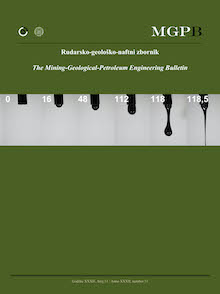Potential of Croatian liquefied natural gas (LNG) terminal in supplying regional natural gas markets
DOI:
https://doi.org/10.17794/rgn.2020.4.8Keywords:
liquefied natural gas (LNG), LNG terminal, gas interconnections, regional gas market supply, solid fossil fuelsAbstract
This paper analyzes the possible role of liquefied natural gas (LNG) in the region in reducing carbon dioxide (CO2) emissions by replacing a certain part of solid fossil fuels. Increasing natural gas consumption, declining North Sea natural gas reserves and increased natural gas production costs in Europe combined have created new opportunities for LNG in Europe. The Energy Strategy of Croatia is focused on intensifying the transit position for natural gas that could establish Croatia as a primary LNG market for countries from the region, which shows that the Energy Strategy supports LNG. Concerning LNG’s introduction into the regional gas market, this paper analyses the possibility of establishing a regional gas hub. The region in this paper includes the following countries: Croatia, Serbia, Bosnia and Herzegovina, Hungary, Slovenia, and North Macedonia. On the other hand, the observed markets are not organized and sufficiently liquid, which is a crucial precondition for hub establishment. In order to decrease the region’s dependence on pipeline natural gas, it is necessary to construct gas interconnections between Croatia – Serbia, Croatia – Bosnia and Herzegovina and Serbia – North Macedonia. With the mentioned interconnections, the region could achieve greater security of natural gas supply. This paper discusses the possibility of utilizing the full capacity of a LNG terminal as a source of natural gas supply for the purpose of replacing solid fossil fuels in the region’s primary energy consumption. By replacing solid fossil fuels with natural gas, it is possible to achieve significant savings on CO2 emissions, which contributes towards a green and sustainable future.
Downloads
Published
How to Cite
Issue
Section
License
Copyright (c) 2020 authors and journal

This work is licensed under a Creative Commons Attribution 4.0 International License.
Creative Commons-BY
Authors who publish with this journal agree to the following terms:
In agreeing this form, you certify that:
- You read the ethical codex of the RGN zbornik available at journal web.
- You submitted work is your original work, and has not previously been published and does not include any form of plagiarism.
- You own copyright in the submitted work, and are therefore permitted to assign the licence to publish to RGN zbornik.
- Your submitted work contains no violation of any existing copyright or other third party right or any material of an obscene, libellous or otherwise unlawful nature.
- You have obtained permission for and acknowledged the source of any illustrations, diagrams or other material included in the work of which you are not the copyright owner.
- You have taken due care to ensure the accuracy of the work, and that, to the best of your knowledge, there are no false statements made within it.
- All co-authors of this submitted work are aware of, and in agreement with, the terms of this licence and that the submitted manuscript has been approved by these authors.
Publication licence
You retain copyright in your submitted work, according to journal license policy (CC-BY). By signing this form you agree that RGN zbornik may publish it under the publication licence. In summary the licence allows the following:
Anyone is free:
- To copy, distribute, display, and perform the work.
- To make derivative works.
Under the following conditions:
- The original author must always be given credit.
- The work may not be used for commercial purposes.
- If the work is altered, transformed, or built upon, the resulting work may only be distributed under a licence identical to this one.
Exceptions to the licence
In addition to publishing the work printed under the above licence, RGN zbornik will also enable the work to be visible online.
The journal editorial can change the licence rules anytime but it cannot retroactively restrict author(s) rights.


